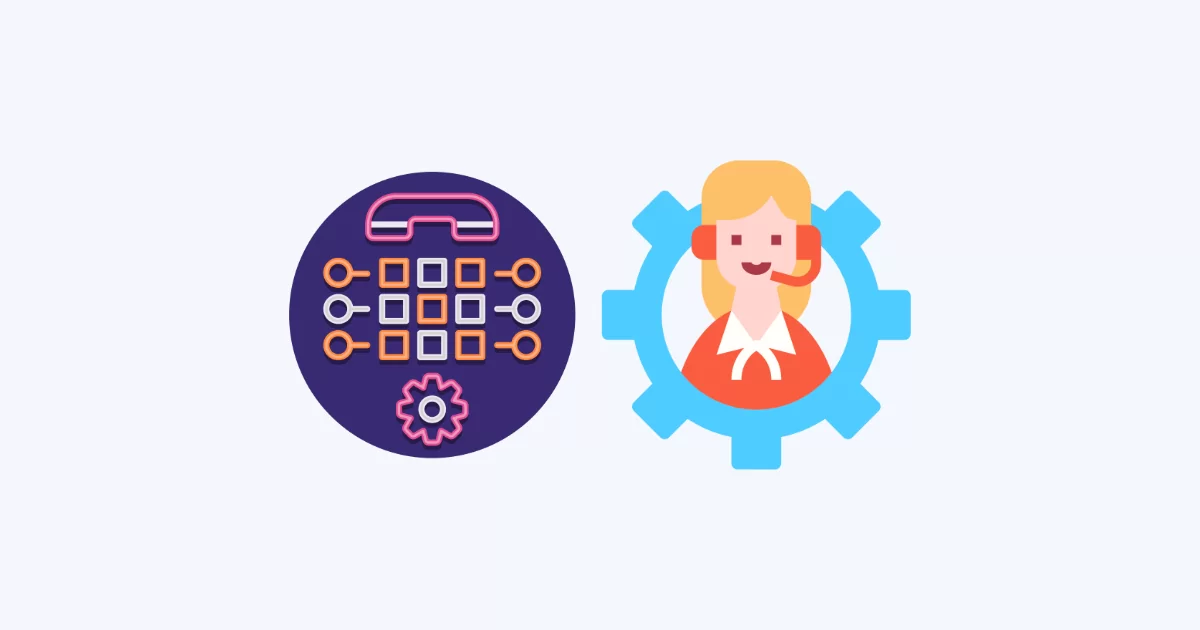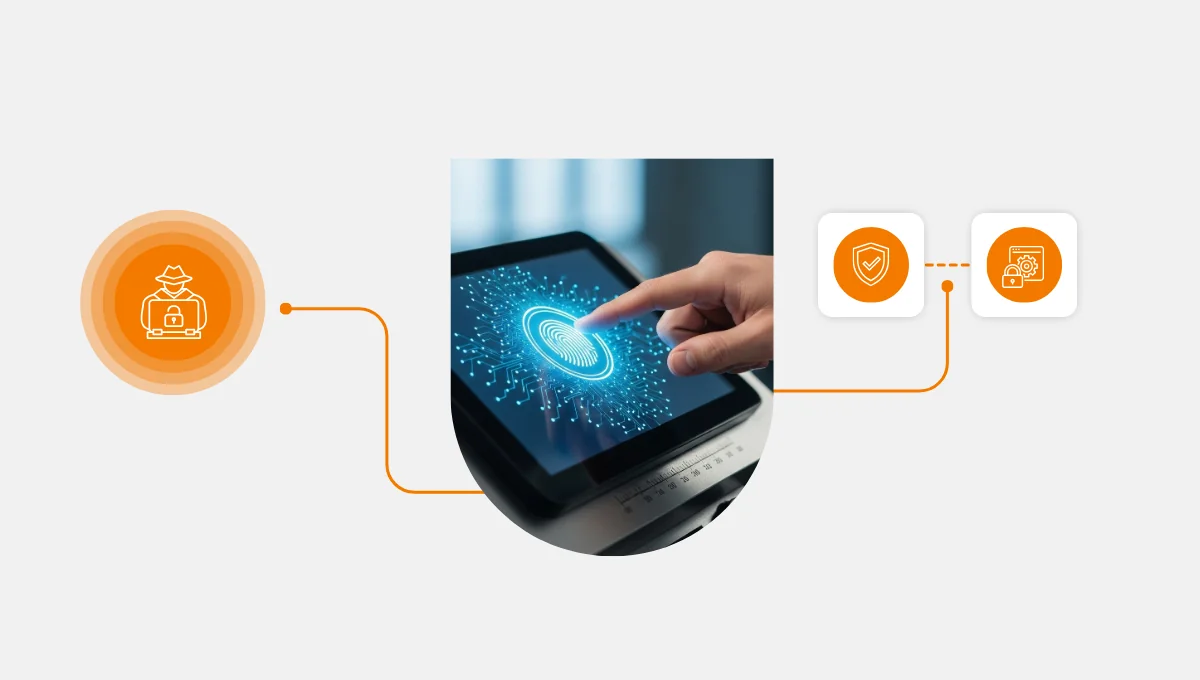Latest technology solutions enable clients to complete straightforward tasks over the phone without the assistance of an agent (pay bills, track packages, make appointments, etc.). This benefits both you and the customer, as you can lower costs and customers can receive responses more quickly. Interactive voice response systems improve the customer experience thanks to the self-service option. This option allows customers to acquire the information they need without reaching out to customer care. IVR also lower the number of calls contact centers receive, reducing wait times and operational expenses for companies. Learn more about IVRs below.
How Does an IVR System Work?
IVR is an automated telephone system which can increase call flow and decrease wait times by fusing computer and telephony technology, improving overall client satisfaction.
IVR software is a developing technology and adds more value to IVR meaning. Modern IVR systems can comprehend customers’ questions and provide a real-time responses thanks to speech recognition.
The following components are commonly found in an interactive voice response phone system:
- A TCP/IP network that offers connectivity to the internet and an intranet.
- Databases that provide relevant info to IVR applications
- IVR software applications that reside on a web/application server. This server is capable of hosting numerous VoiceXML-based apps.
One of the three IVR systems is normally built from this point.
- A touch-tone keypad selection is required to retrieve information using this technology, which replaces touch-tones. For instance, a pre-recorded voice might instruct the caller to press “one” to learn the store’s hours.
- Directed dialogue: IVR gives the customers tailored voice prompts depending on their inquiry. “Are you seeking business hours or a location?” the recording might inquire. The caller might answer by saying, “Store hours.”
- This sophisticated IVR system uses speech recognition to interpret consumer requests. The system prompt can ask, “What information are you looking for today?” as an illustration. And the caller can respond stating their request, such as “I’m looking for store hour information.”

What Are the Benefits of an IVR System?
Some intrinsic benefits of IVR are discussed below:
Increased Customer Satisfaction
No one enjoys wasting time. But when someone phones a call center, the lengthy wait to speak with a live agent and the prolonged hold times are a cause of concern. This often occurs when an agent is not trained to handle a specific issue or if there is frequent switching between departments. The worst-case scenario is when the customer’s issue is left unresolved.
Callers can use the IVR to find the information that they need, or the IVR can assess their needs and transfer them to the appropriate person to assist with their inquiry. Customers no longer need to make a second phone call due to increased first contact resolution (FCR). With the use of IVR, customers will believe that choosing your business is not wasting time and money.
The greatest systems offer you many opportunities to tailor your IVR encounters with your callers since they are highly adaptable. This includes custom business greetings that you can alter at any time.
You can also link personal information with the caller’s phone or account number when you merge it with your customer relationship management system. For example, the IVR can address customers by name. Additionally, it is possible to program the IVR menu in various languages, allowing callers to select their preference. The options are limitless.
Increased Efficiency
IVR’s aim is not to replace call center agents. It was designed to simplify the lives of your agents. The number of calls agents handle would drop since an automated IVR could answer many easier questions.
Without an effective IVR, contact centers may be overrun by incoming calls, putting agents on the receiving end of calls they are ill-prepared to handle. Agents may become frustrated since they are unable to address customers’ issues. Stress and misery are caused by frustration. All this may lead to unproductive, indifferent workers about to quit.
By answering simple questions, a correctly configured IVR can reduce the number of calls that need to be handled by agents. Additionally, it integrates with the skill-based routing function to ensure that agents solely get the calls that they are qualified to handle. As a result, call center representatives are more effective, successful, and content.
Reduced Costs
Speaking of not being human, IVRs are automated, which means they are not prone to mistakes. In addition to the potential for overloading by high call volumes, human handling of incoming calls can naturally result in errors, such as when calls are misdirected to the incorrect department or agent.
If your contact center has an IVR system, every call moves through the same logical sequence set into the phone menu. As a result, fewer human errors in call handling are made, which improves the efficiency of your business. You can ensure that every caller has the same IVR experience by automating how your company receives calls.
IVR systems are remarkably economical. They can boost access to information during off-peak times and reduce the high call volumes for customer support professionals.
Improved Data Collection
Through the use of a telephone keypad, respondents can communicate with a computer system via IVRS. The IVR system can react with pre-recorded audio that instructs users on how to interact. Users can then enter data by listening to and responding to the IVR dialogue.
IVR-based data collection benefits:
- Performs on any simple phone–no smartphone required.
- Calls can be placed in the native tongue. The literacy level of the data provider is not a barrier.
- Call-back and missed call functionality come with zero cost to respondents. The administrators have the ability to view real-time data via a web portal.
- Post-call SMS-based evaluation

How to Choose the Best IVR System
The clients and calls of today are a distinct “breed” from recent years. The instant satisfaction of digital services and online commerce has cultivated an expectation of quick service across all channels.
Even though you might not require more sophisticated services like chatbots, payments, and text messaging, you probably will in the future. Make sure the IVR system you choose has the flexibility to expand with you and your company.
The decision to use a cloud-based solution is practically obvious. It guarantees mobility and simple telecom integration. More importantly, it relieves your IT personnel of yet another system management duty.
Interactive Voice Response Solution: Improving Customer Experience
The IVRS phone system can change the entire game for your call center business. Many businesses that have adopted cloud call center solutions are already seeing fruitful results regarding voice response rates, automatic IVR calls, and agent performance.
For focused solutions such as “inbound call center” and “call center software” to scale your business processes, click on the links.
Reference Links:
https://www.ibm.com/topics/interactive-voice-response
https://www.ttec.com/glossary/interactive-voice-response
https://www.ringcentral.com/contact-center/interactive-voice-response.html
https://www.geopoll.com/blog/ivr-surveys-step-by-step-guide/




